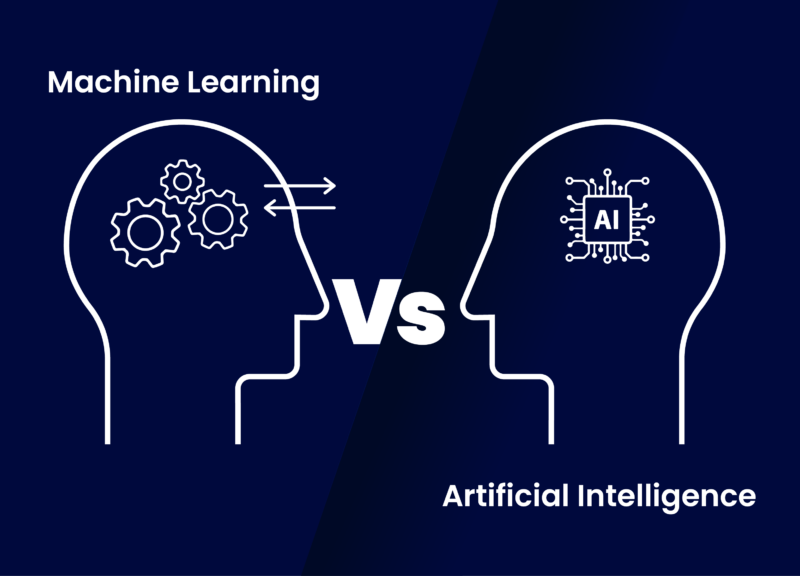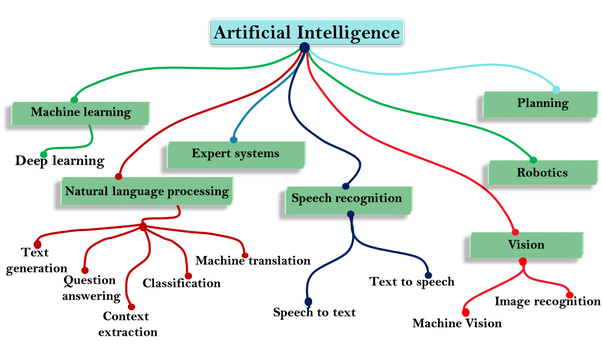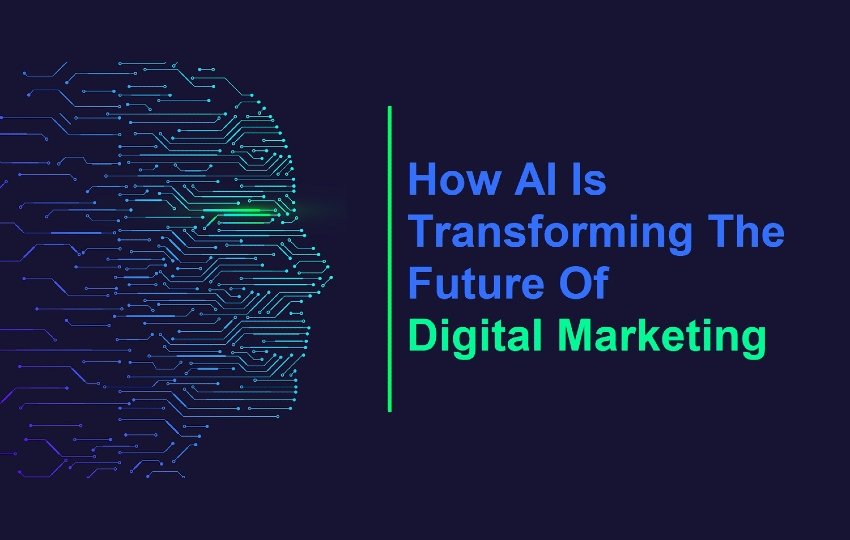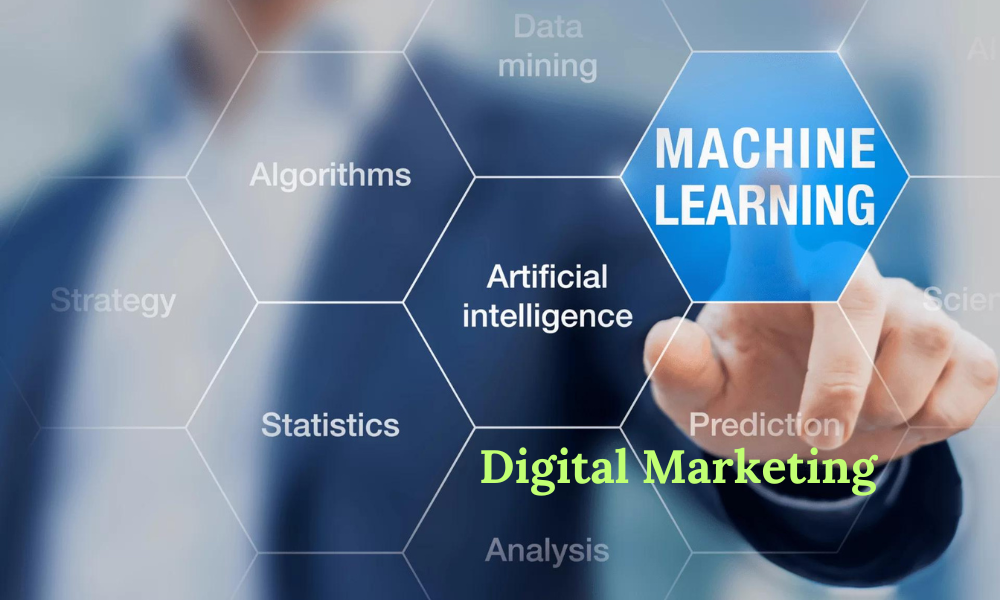What’s Next for AI and Machine Learning in Digital Marketing
As technology continues to grow, we are witnessing regular updates in digital world. One of the most significant advancements shaping its future is the integration of artificial intelligence (AI) and machine learning (ML).

From predicting consumer behavior to automating routine tasks, AI is not just revolutionizing; it is reshaping the landscape of digital marketing. This article will explain everything you need to know about
AI and Machine Learning in Digital Marketing
AI impact on digital marketing is evident through hyper personalization and user engagement strategies. Through AI marketers are getting appropriate information about user preferences and providing the right type of personalized content.
In addition, numerous AI tools are simplifying and improving sales performance through campaign optimization.
Types of AI and Machine Learning
Understanding about the types of AI and machine learning will help in knowing more about their impact on today’s digital marketing dynamics.

Chatbots: Chatbots are tools that utilize machine learning to collaborate with customers. They are trained to answer customer queries and fill orders accurately and tirelessly. You have seen various websites offer instant customer support. These are chatbots train to help you by replying the questions.
Voice Search: With the evolution of AI, voice search is getting popular with every passing day. Now the audience prefers voice search instead of typing the text. AI utilizes voice recognition technology already incorporated into its products.
Machine Learning: Machine learning refers to a process in which machines find out how to solve a problem with available data and make predictions on decision-based information. Marketing professionals apply it into lead generation and SEO.
Integration of AI with Digital Marketing
Since the launch of Chatgpt, AI has become a key aspect in the advancement of digital marketing strategies. It is also helping established brands to gain detailed insights about the audience and improve their strategies.
Machine learning algorithms are also an important Ingredient in digital marketing when it comes to personalization. They evaluate tons of data to design content according to the user requirements. Predictive analytics is yet another great tool to help marketers anticipate audience behavior.
Through Artificial intelligence and machine learning marketers can develop winning marketing strategies. AI tools offer real-time data to the experts helping them forecast future trends and make appropriate plans.
Improving Personalization With AI
AI has brought automation in the marketing industry, helping experts to leave all the repetitive tasks on the AI tools and focus on productive operations. In addition, AI tools are also helping businesses to improve user experience through offering personalized content.

Marketing experts are now leveraging AI Tools in various tasks such as forecasting user behavior and segmenting them. Through artificial intelligence, you can distribute customer groups based on their unique behavior and preferences.
It helps them to deliver messages to the right audience that results in higher engagement and increased organic traffic. In addition, AI is also helping humans to generate accurate and valuable content for the audience.
Generative AI creates content through employing Natural language processing techniques. Generative AI is advanced enough to copy the content style, format and its tone to offer readers a helpful material.
Marketing Strategies Optimization Through AI

AI and data analytics are important elements in establishing marketing strategies that improve ROI. Investing in these tools help marketers to get vast data and drive successful campaigns that result in higher conversion rates.
Ethical Considerations and Challenges
While AI offers numerous benefits, it also raises ethical concerns. Issues like data privacy, algorithmic biases, and job displacement need to be addressed to ensure responsible AI deployment.
Businesses must implement robust data protection measures and strive for transparency and fairness in their AI applications to build trust with their customers.
Ethical Considerations and Challenges in AI Deployment
Artificial Intelligence (AI) has revolutionized various industries by providing innovative solutions and optimizing processes. However, the deployment of AI also brings forth significant ethical considerations and challenges that need careful attention and action. Here, we delve into the key ethical issues and the necessary steps businesses must take to address them.
Data Privacy
Data Privacy refers to the protection of personal information collected, stored, and processed by AI systems. This is a critical concern as AI technologies often rely on large datasets that include sensitive personal data. The main challenges include:

- Consent and Control: Ensuring individuals provide informed consent for their data to be used and maintaining their control over their personal information.
- Data Security: Protecting data from breaches and unauthorized access, which can lead to identity theft, financial loss, and other harms.
- Anonymization: Properly anonymizing data to prevent the re-identification of individuals, which can be technically challenging.
To address these concerns, businesses must:
- Implement Robust Security Measures: Use encryption, access controls, and regular security audits to protect data.
- Ensure Transparent Data Practices: Clearly communicate how data will be used, stored, and protected, and provide easy-to-understand privacy policies.
- Adopt Privacy-By-Design Principles: Integrate privacy considerations into the development of AI systems from the outset.
Algorithmic Biases
Algorithmic Biases arise when AI systems produce unfair or discriminatory outcomes. These biases can stem from biased training data, flawed algorithms, or unintentional design choices. The primary concerns include:
- Fairness and Equity: Ensuring AI systems do not perpetuate or exacerbate existing societal biases and inequalities.
- Accountability: Holding developers and organizations accountable for biased outcomes produced by their AI systems.
- Transparency: Making the decision-making processes of AI systems understandable and explainable to users and stakeholders.
To mitigate algorithmic biases, businesses should:
- Diverse and Representative Data: Use datasets that reflect the diversity of the real world and regularly update them to avoid outdated biases.
- Bias Detection and Mitigation Tools: Employ tools and techniques to detect and correct biases during the development and deployment of AI systems.
- Inclusive Development Teams: Foster diverse teams to bring various perspectives and reduce the risk of unintentional biases.
The Future of AI in Digital Marketing
The future of AI in digital marketing is promising, with emerging trends pointing to even more sophisticated and integrated applications. From AI-driven video content to advanced predictive analytics, the possibilities are endless.

Businesses that stay ahead of these trends and embrace AI innovations will be well-positioned to thrive in the competitive digital landscape.
Conclusion
AI and machine learning are transforming digital marketing in unprecedented ways. From enhancing personalization and content creation to optimizing advertising and customer service, these technologies are revolutionizing how businesses engage with their audiences. Staying updated with AI advancements and integrating them into marketing strategies is crucial for success in the digital age.
Read more : Power of AI in Customer Engagement for Furniture Stores
Read more : How AI is Transforming SEO
FAQs
AI helps in automating tasks, analyzing data, personalizing content, and optimizing marketing strategies to enhance customer engagement and improve ROI.
AI enhances customer experience by delivering personalized content, providing instant support through chatbots, and analyzing customer behavior to anticipate needs and preferences.
Yes, AI chatbots are effective in handling customer inquiries, providing instant support, and improving overall customer satisfaction by offering timely assistance.
Ethical concerns with AI in marketing include data privacy, algorithmic biases, and the potential for job displacement. Addressing these issues is crucial for responsible AI deployment.
Businesses can prepare for future AI developments by staying informed about the latest trends, investing in AI technologies, and continuously optimizing their strategies to leverage AI’s full potential.

Alex Mitch
Welcome to my blog! With over 10 years in digital marketing , I’ve seen its incredible impact on smaller businesses. Join me as we explore how digital marketing can grow your audience and boost your business. Whether you’re an experienced entrepreneur or just starting out, you’ll find practical tips and insights to enhance your digital marketing strategies.





